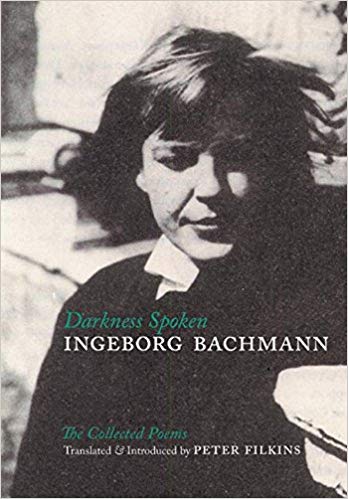For someone who spent her life wrestling with the enormous and existentially brain-warping problem of language’s inability to provide adequate means of expression, Ingeborg Bachmann made brilliant use of the twenty-six letters afforded her. Austrian by birth, Bachmann grew up during World War II, and her objection to fascism became central to her writing. In her early twenties Bachmann found camaraderie within Gruppe 47, a band of left-wing German writers (including Paul Celan and Günter Grass) who concerned themselves with the futility of language and the rebuilding of German literature after World War II. While she worked in other literary mediums, such as fiction and radio plays, her first serious foray into writing was as a poet, and Darkness Spoken gathers the sum of this endeavor: her two published books of poetry, Borrowed Time and Invocation of the Great Bear, and numerous uncollected works.
The fuse that runs through these powerful poems is the powerlessness of language, its continual failure to measure up: “Between a word and a thing / you only encounter yourself, / lying between each as if next to someone ill, / never able to get to either.” At times, communication remains downright impossible. In “[I’ve misplaced my poems]” Bachmann admits to writing of pain that “I know only that it cannot be spoken of,” and “Your Voice” is an explanation to her lover that “even if you say everything, I will never grasp it.” However, even in its inadequacy, language can provide painful salvation: “I again learned to speak and I wept / when a word escaped me.”
Fascination with language is constant throughout Bachmann’s work, but the style and content of the poems noticeably shifts over the course of her career. Elaborate yet restrained, the early work draws on fairy tales (“Coins fall from the sky”) and mythology (“Like Orpheus I play / death on the strings of life”), spinning dark worlds not unlike those of the Brothers Grimm: “Rose Red smeared tar on my forehead / and hair, someone had strangled / her snow-white sister.” Filled with poisonous blossoms, steel feathers, and beheaded angels, these poems burn with a sinister enchantment that complicates Bachmann’s discussion of human suffering.
In later work, her focus shifts to interior landscapes and personal grief. After her 1962 breakup with novelist and playwright Max Frisch and subsequent hospitalization, Bachmann’s writing takes on a raw, hungry quality that pours forth unobstructed. Poems written during the next several years move from an eerie calm to a brief, howling desperation that illuminates a nakedness not found in earlier work:“They have smoked out / every feeling inside me, / I don’t know what warm / or cold or blue/is.”However, even as Bachmann writes of a descent into misery and fury, her despair is tempered by a willful desire to go on living: “That a person who fell into / darkness is standing once again, / shout it out.”
Though her life was cut short in 1973, under mysterious circumstances, several weeks after being injured in an apartment fire, Bachmann’s final poems reach a balance between the qualities of her early and middle work. Bleeding together witness and subject, Bachmann infuses her poems with a new power, capturing a sense of peace that, ironically, looks to the future: “If Bohemia still lies by the sea, I’ll believe in the sea again. / And believing in the sea, thus I can hope for land.”





